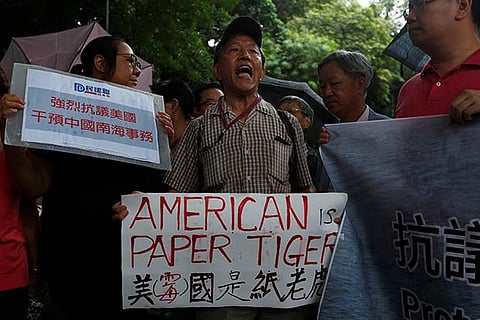

Washington
“What we want is to quiet things down so these issues can be addressed rationally instead of emotionally,” said one official, who spoke on the condition of anonymity to describe private diplomatic messages. Some were sent through US embassies abroad and foreign missions in Washington, while others were conveyed directly to top officials by Defense Secretary Ash Carter, Secretary of State John Kerry and other senior officials, the sources said.
“This is a blanket call for quiet, not some attempt to rally the region against China, which would play into a false narrative that the US is leading a coalition to contain China,” the official added.
The effort to calm the waters following the court ruling in The Hague on Tuesday suffered a setback when Taiwan dispatched a warship to the area, with President Tsai Ing-wen telling sailors that their mission was to defend Taiwan’s maritime territory. The court ruled that while China has no historic rights to the area within its self-declared nine-dash line, Taiwan has no right to Itu Aba (Taiping), the largest island in the Spratlys. Taipei administers Itu Aba but the tribunal called it a “rock”, according to the legal definition.
China warns of ‘decisive response’ over South China Sea talks
Meanwhile, China warned of “decisive response” if any provocative action is taken in the South China Sea to enforce an international tribunal’s verdict against Beijing’s expansive claims in the strategic region.
“I want to stress that if any one wants to take any provocative action against China’s security interest based on the award China will take a decisive response,” Foreign Ministry spokesman Lu Kang told reporters.
Responding to questions on the impact of the verdict given by a tribunal appointed by The Permanent Court of Arbitration (PCA), he said it was “unlawful” as it was established at the unlawful request of the previous Philippine government. The award issued by it will not have any effect on China’s existing policy, he said.
Visit news.dtnext.in to explore our interactive epaper!
Download the DT Next app for more exciting features!
Click here for iOS
Click here for Android